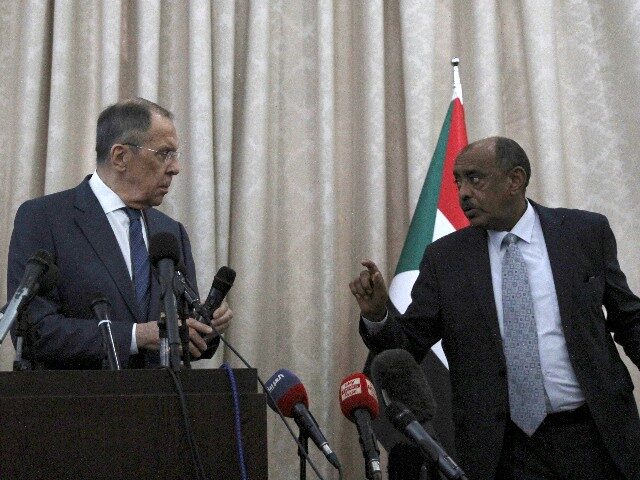Russian Foreign Minister Sergei Lavrov continued his swing through Africa on Thursday by meeting with the ruling junta in Sudan immediately after pledging Russia’s support to the military coup that rules Mali.
The foreign minister for the Sudanese junta, Ali al-Sadiq, told state media that talks with Lavrov would focus on Sudan’s relationships with neighboring countries, but there are reasons to suspect the Russians have a much broader agenda in mind.
Lavrov arrived immediately after U.S. and European emissaries spent two days encouraging the junta to surrender power voluntarily and “transition” to democracy, something it has promised to do ever since the democratically elected government was overthrown by the military in October 2021. Democracy was only given two years to flourish after longtime dictator Omar al-Bashir was himself overthrown in a coup in 2019.
Junta leader Gen. Abdel Fattah al-Burhan does not seem enthusiastic about the prospect of stepping down and restoring democracy. Burhan’s regime has aggressively purged dissident civilian figures from government and rewritten Sudan’s political rules to thwart democratic elections.
The junta responded with a violent crackdown when citizens protested military rule on the anniversary of the coup in October 2022. The protesters chanted “soldiers go back to the barracks!” and vowed there would be “no partnership, no negotiation with the putschists.” Protest leaders said keeping the junta frozen out of the African and international communities was vital to squeezing it out of power.
Human rights activists denounced the junta’s abuses and expressed concerns for the safety of dissidents, including journalists covering the demonstrations, who were arrested and attacked by junta supporters with alarming frequency.
In December, the U.S. government insisted the junta stick to the latest timetable for fair elections and promised to ban visas for any Sudanese officials who continue to sabotage the transition to civilian government.
Russia, by contrast, does not have any problem in principle with military rulers cracking down on protests and throwing dissidents in jail.
At a press conference in the Sudanese capital of Khartoum on Thursday, Lavrov said Sudan and Russia are “cooperating in the fields of economy and investment” and praised Sudan’s attempts to “attract Russian investments.”
Lavrov said Russia stands with the junta “in its endeavor to lift the sanctions imposed by the United Nations Security Council.”
Those U.N. sanctions include an arms embargo dating back to the Darfur uprising against Bashir’s regime in 2003. In a letter to the U.N. Security Council last week, Sudan demanded the lifting of the embargo, arguing that nothing about the Darfur sanctions language required Sudan to have an elected government.
The junta further argued that restricting its ability to obtain weapons made it difficult to vanquish “rogue armed transboundary bands” that are disrupting “peace and order in Darfur.”
“Sudan will accept nothing less than the immediate lifting of these sanctions without conditions or benchmarks,” the letter said.
Russia was Sudan’s military patron for decades under the Bashir regime, and the current junta leaders have close ties with Moscow. In the closing months of Bashir’s rule in 2019, Moscow admitted that Russian instructors were on the ground in Sudan to train its military forces, a fact the Russians long struggled to conceal.
Lavrov admitted on Thursday that one of the Russian “contractors” active in Sudan is indeed the notorious Wagner Group, a brutal mercenary outfit that has been using prisoners – including Africans – as cannon fodder to support the Russian invasion of Ukraine.
Lavrov insisted Wagner mercenaries are merely “working on fighting terrorism” in Sudan and other African countries, implicitly denying reports that Wagner mercs based in Sudan have been fighting to take control of gold mines in the neighboring Central African Republic.
“These companies are private military and security companies coming to these countries according to agreements with the governments that have sovereignty over their countries,” he said.
Russia’s agenda in Sudan has long included establishing a Red Sea naval base, a project it began working on under the Bashir regime.
The plan for a naval base was delayed under intense pressure from the U.S. and Europe, but the U.S. ambassador to Sudan felt it necessary to warn the junta in September that it will face further sanctions and isolation from the international community if it gives Russia what it wants.
The junta responded by insisting “there is no full agreement with Russia on the establishment of a naval base in the Red Sea, but our military cooperation has been extended.”
Al Jazeera News reported on Thursday that it “could not immediately establish” if the base was on Lavrov’s agenda during the visit, but it quoted Russian officials who said Moscow was increasingly turning to African partnerships as the West isolates it for invading Ukraine.
Dmitry Trenin of the Russia Foreign and Defense Policy Council in Moscow said:
The main reason [for Russia’s interest in Africa] is the earthquake that destroyed Russia’s relations with Europe and the wider West. With the hybrid war between the West and Russia, it is countries in the Middle East, Africa, and Asia that are considered to be Russia’s most important and only Russian partners.
Al Jazeera noted that Lavrov met in Khartoum with Gen. Mohamed Hamdan “Hemedti” Dagalo, head of the paramilitary Rapid Support Forces (RSF) – among the most brutal supporters of the coup, a force with a documented history of human rights abuses that grew out of the infamous janjaweed militia of the Bashir era. Dagalo, in turn, visited Russia to discuss the deal for a naval base on the Red Sea on the day before the invasion of Ukraine began.

COMMENTS
Please let us know if you're having issues with commenting.